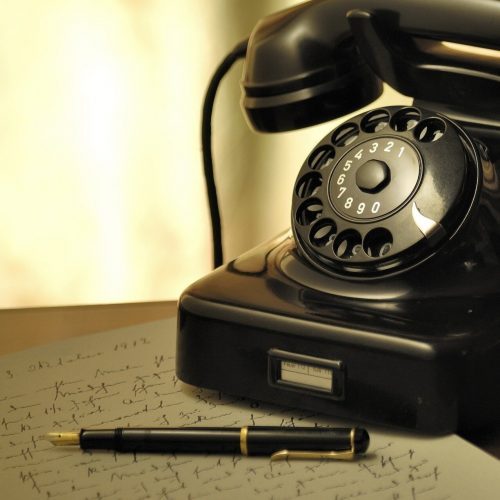
How to: Talk on the Phone in Spanish
Dear Marie,
Some people like talking on the phone more than others, but the fear around having to talk on the phone in a new language seems pretty universal. And we think that this is totally valid! In fact, more than once we have been in situations where we have tried to figure out how to avoid calling in Spanish. However, there are five tricks that we have learned over the years to make talking on the phone in Spanish easier.
 1. Find confidence in your Spanish skills
1. Find confidence in your Spanish skills
While this might not be a trick per se, having confidence in your speaking skills will go a long way to ensuring that the phone call goes well. Why? Because when you are confident in your skills, you will be more likely to be able to follow through with the other tricks we have below instead of panicking. If all the confidence does is reduce your chance of panicking, the probability of having a good phone conversation goes up because you will be able to pay attention to and respond appropriately to the details.
If you are wondering how to find confidence in your Spanish skills, we recommend taking time to practice with friends or go to intercambios. We find that by practicing with others, you set yourself up to better understand different accents and vocabulary. In addition, the more you use your language skills, the more confident you will get—a positive cycle.
2. Plan what you want to say or ask
If you are feeling worried about what you are supposed to communicate or ask for, plan it out and write down key words or questions. Bonus points here if you write down the ideas in Spanish so that you have the translations in front of you if you need them. This will help you because you will be able to follow along in the conversation, going back to key ideas if you need to. Having a list will also ensure that you are not forgetting anything.
We also recommend that you have a way of writing down the answers to the questions on your list. And, if you have not actually planned the conversation out, at least keep a pen and paper next to you during the call so that you can note down anything that is important. While it might not seem like a big deal, if you are nervous, you might forget some of the questions or answers you received and this will make sure you have the important bits written down.
3. Slow down (and ask them to as well)
In order to ensure that you are correctly understood, consider slowing down your speaking. This will put less pressure on you to get the sentences out quickly and give you the ability to pronounce words as best you can. You don’t want to talk super slow, but just breathing deeply can make a big difference to how others understand you.
In addition, don’t be afraid to ask the other party to hablar un poco más despacio, or speak a little bit slower as well. We know that it is not always easy to comprehend what the person on the other side of the phone is saying and that can be due to how fast they are talking. The only thing you have to lose if you don’t ask them to slow down, clarify, or explain what someone is saying is your own understanding of the situation.
4. Make sure you understand
To the previous point, an excellent phone call is only ‘excellent’ if both of you have the same perspective about the results. We know that it is easy for cultural differences to play a role in our expectations of answers and are aware that sometimes we think we hear something that the other person didn’t intend to say. Therefore, if you have any doubts about what has been agreed upon, we recommend asking!
Most of the time, clarification is as simple as repeating back to the person what you thought you heard. This allows you to share your interpretation of the words you understand back to the person and gives them the opportunity to agree or correct you. While this might not be necessary in all situations, it is not a bad idea to get confirmation on what you are thinking for anything from the time you are meeting for tapas to information about a bill you have to pay.
5. Ask a friend to call for you
This might seem like a bit of a cop-out or not taking the situation into your own hands but sometimes you just need a native speaker to make the call. We have all been there and while it can be frustrating not to be able to do it yourself, there is nothing wrong with asking a friend for help once in a while. This is especially true if the phone call is about something important and you don’t fully understand the vocabulary. It is also a technique you can use if you have personally tried multiple times and haven’t managed to get a point across.
 While we don’t recommend this as a solution for every call you make, it can come in handy! For example, telephone companies in Spain can be quite insistent in not allowing you to cancel your phone card (read more about getting a Spanish phone number here) and, from personal experience the person on the other end of the phone can make life difficult for a non-native speaker. Asking a friend to fill that role can save you lots of time and frustration.
While we don’t recommend this as a solution for every call you make, it can come in handy! For example, telephone companies in Spain can be quite insistent in not allowing you to cancel your phone card (read more about getting a Spanish phone number here) and, from personal experience the person on the other end of the phone can make life difficult for a non-native speaker. Asking a friend to fill that role can save you lots of time and frustration.
Let us know about your phone calling experiences in the comments!
Sincerely,
Spain





